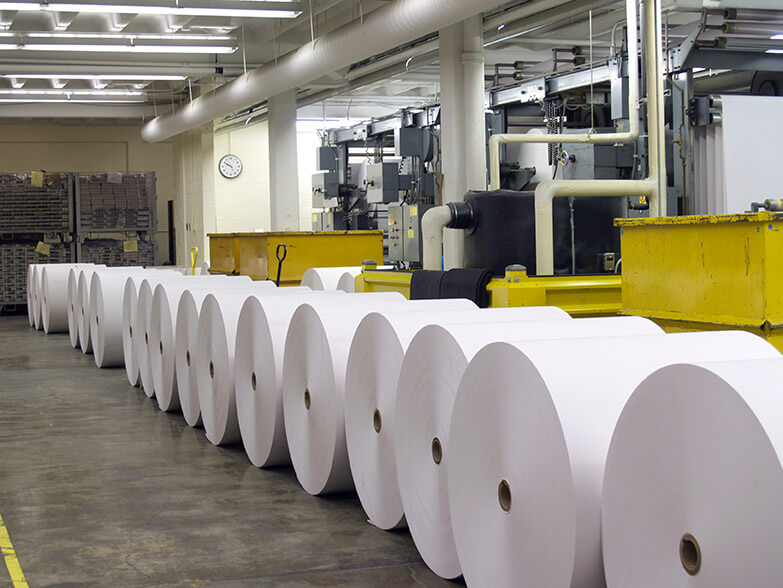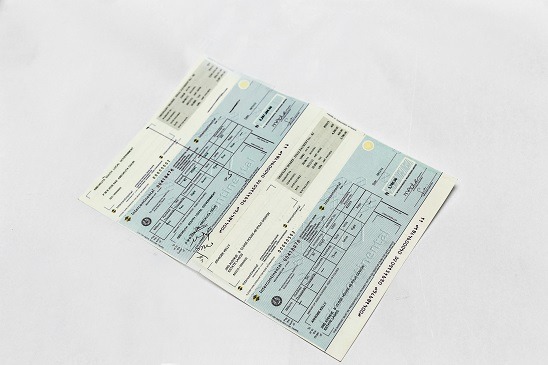While you may not often stop to consider where your paper comes from, it’s worth knowing that behind every textbook, A4 rim, receipt, packaging, and ballot paper produced in Nigeria lies an industry on the brink of collapse. In 2024, Nigeria—Africa’s largest paper consumer—used an estimated 2.8 million tonnes of paper, valued at nearly $3.6 billion. Yet, with domestic mills meeting only about 7% of this demand, the country continues to spend billions of naira on imports annually, missing the opportunity to fuel homegrown jobs and industries. Nigeria’s paper manufacturing sector holds immense potential to drive economic growth, create employment opportunities, and fuel broader industrial development. But despite this promise, the industry remains stifled, held back by an overreliance on imported paper products and weak policy support.

The Paper Expert – Paper Reels Display
CHALLENGES AFFECTING THE PAPER INDUSTRY
At a recent stakeholders’ meeting, Mr. Gabriel Okonkwo, Chairman of the Printing, Publishing and Allied Group (LCCI), revealed that some of the challenges encountered by local paper manufacturers include the high operation cost, difficulty in sourcing materials and major emphasis on the effect of government policies favouring imported finished material. This imbalance has created a deep market distortion, making it far cheaper and more economical to print and import finished materials. As a result, Nigerian manufacturers are placed at a serious competitive disadvantage, forcing a growing number of printing jobs to be executed outside Nigeria. This also has a major effect on the Nigerian printing industry, which heavily relies on imports for over 80% of its paper and consumables due to the lack of local alternatives. Import duties on these essential items can reach up to 25%, resulting in high productioncosts.
The fallout is significant – local production is weakened, investments are driven away, increased dependence on foreign publishing/printing and the economy is missing out on critical opportunities to create jobs, conserve foreign exchange, and build industrial self-reliance. Without immediate and strategic government intervention, the paper manufacturing sector, despite its vast potential, risks becoming obsolete, undermining Nigeria’s broader goal of economic diversification and sustainable growth.
SIGNS OF HOPE: LOCAL EFFORTS THAT ARE MAKING A DIFFERENCE
While many organizations continue to outsource paper manufacturing jobs to foreign markets, there are encouraging signs of progress. Nigeria’s electoral commission (INEC) has recently begun sourcing ballot papers locally, an important development that demonstrates both confidence in domestic capacity and recognition of the competence within the local manufacturing sector. Also, with the “Nigerian First Economic Policy”, there is a renewed advocacy for prioritizing local content and supporting indigenous industries through public procurement and investment incentives. If properly enforced, such policies could serve as a turning point for the paper manufacturing sector, encouraging locally produced materials and attracting new investment into the industry.

In a discussion with Mr. Eric Wang, Managing Director of NIXIN Paper Mill, he shared that his hometown in China with a population of just 300,000 supports a paper manufacturing capacity of 20,000 tons monthly. This comparison underscores the missed potential in Nigeria, which, with a population of 200 million people and a much larger market size, should be a powerhouse in paper production. In commitment to the vision and potential Nigeria paper industry offers, NIXIN Paper Mill is actively expanding its production capacity, improving product quality, and diversifying its product line to reduce Nigeria’s reliance on imported paper and strengthen the local economy.
WHAT POLICYMAKERS AND BUSINESSES CAN DO
The government and private sector have a role in reviving the paper industry. Some practical steps include:
- Reform Tariff Structures to Boost Local Competitiveness: Lowering tariffs on paper, inks, and consumables to 5% will reduce production costs and help local manufacturers compete with imported alternatives.
- Support Local Sourcing: Public institutions should prioritize Nigerian-made paper for textbooks, examination papers, ballot sheets, and official documents to stimulate demand and boost investor confidence.
- Invest in Research and Training: Partnerships with universities and research institutes should be established to develop local expertise in pulp processing, recycling, and industrial printing technologies.
- Incentivize Local Production: Tax breaks, grants, and infrastructure support should be provided to businesses investing in domestic paper mills and printing material production.
- Encourage Forestry and Recycling: Support afforestation programs and establish paper recycling hubs to ensure a sustainable supply of raw materials and reduce dependence on imports.
Considering the substantial demand for paper products across the education, government, hospitality, and industrial sectors, Nigeria represents a lucrative and expanding market. Addressing these challenges would enable local manufacturers to compete more effectively, meet domestic demand, reduce reliance on imports, and stimulate broad-based economic recovery.
CONCLUSION
The real question is no longer whether Nigerian paper manufacturers have the capacity. The urgent question is whether policymakers will rise to the challenge and remove the obstacles holding back the paper industry. This sector is not merely about producing paper for textbooks and packaging, it’s about building a resilient, job-rich, and export-driven industrial base. Targeted reforms such as removing import duty on raw materials, investing in infrastructure, and providing incentives for local production could set the sector on a fast track to recovery.
With the right support, Nigeria can transition from heavy importation to robust local production, reviving a strategic industry, empowering businesses, and preserving valuable foreign exchange. The window of opportunity is open, but time is of the essence. Nigeria’s paper industry doesn’t just deserve a second look—it demands decisive action.






